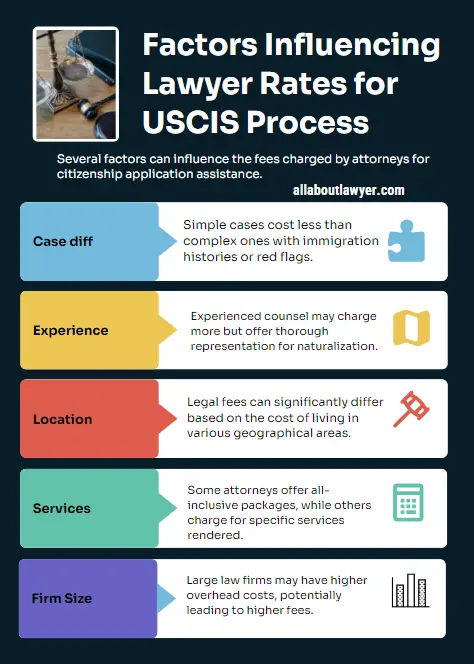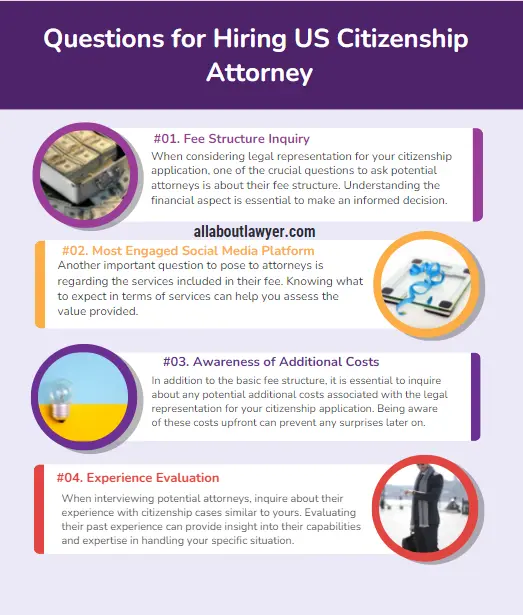How Much Does a Lawyer Charge for U.S. Citizenship Application?
In fact, in 2022 alone, the U.S. Citizenship and Immigration Services (USCIS) received over 900,000 naturalization applications, and while the majority were successful, the interview stage can still be a make-or-break moment. The stakes are high—missteps, misunderstandings, or incomplete documentation can delay or even derail your citizenship journey.
This raises an important question: Do you need a lawyer for your US citizenship interview? In this article, we’ll explore the benefits and drawbacks of legal representation during the naturalization process, providing you with clear insights to help you make an informed decision as you approach this pivotal milestone in your life.
Table of Contents
Understanding the Citizenship Application Process
Before delving into the costs associated with legal representation, it’s essential to understand what the citizenship application process entails. Naturalization, the process by which a foreign national becomes a U.S. citizen, involves several steps:
1. Determining eligibility
2. Completing and filing Form N-400, Application for Naturalization
3. Attending a biometrics appointment
4. Completing the citizenship interview and exam
5. Taking the Oath of Allegiance
Each of these steps can present unique challenges, which is why many applicants seek citizenship legal costs advice from professional attorneys.
Factors Influencing Lawyer Rates for USCIS Process
Several factors can influence the fees charged by attorneys for citizenship application assistance:
1. Complexity of the Case: Straightforward cases typically cost less than those involving complicated immigration histories or potential red flags.
2. Attorney’s Experience: More experienced immigration counsel may charge higher rates but can often provide more comprehensive naturalization legal representation costs.
3. Geographic Location: Legal fees can vary significantly based on the cost of living in different areas.
4. Scope of Services: Some attorneys offer comprehensive packages, while others charge for individual services.
5. Firm Size: Large law firms may have higher overhead costs, potentially leading to higher fees compared to smaller practices or solo practitioners.

Average Cost Ranges for Citizenship Application Legal Assistance
While fees can vary widely, here are some general ranges for citizenship process legal bills:
1. Initial Consultation:
Many attorneys offer free initial consultations, while others may charge $100-$300 for this service.
2. Basic Application Assistance:
For straightforward cases, attorney charges for naturalization can range from $500 to $2,000.
3. Comprehensive Services:
Full-service representation, including application preparation, interview coaching, and attendance at the USCIS interview, can cost between $1,500 and $5,000 or more.
4. Complex Cases:
For cases involving criminal history, long absences from the U.S., or other complications, fees can exceed $5,000 and may reach $10,000 or more.
Fee Structures: Understanding How Attorneys Bill
Lawyers may use different fee structures for citizenship filing legal costs:
1. Flat Fee: A set price for handling the entire naturalization process.
2. Hourly Rate: Billing based on the time spent on your case, typically ranging from $100 to $500 per hour.
3. Tiered Pricing: Different fees for various stages of the process.
4. Unbundled Services: Charging separately for specific services, allowing clients to pick and choose what they need.
Additional Costs to Consider
When budgeting for legal assistance, keep in mind that there may be additional expenses beyond the attorney’s fees:
1. USCIS Filing Fees:
As of 2023, the N-400 filing fee is $725 ($640 application fee + $85 biometric fee), which is separate from attorney fees.
2. Document Preparation:
Costs associated with obtaining necessary documents, translations, or certifications.
3. Photocopying and Postage:
Expenses related to preparing and submitting your application package.
4. Travel Expenses:
If your attorney needs to travel for your case.
Ways to Manage US Citizenship Legal Costs
If you’re concerned about the expense of legal representation, consider these options:
1. Pro Bono Services:
Some attorneys offer free or reduced-cost services to low-income applicants.
2. Non-Profit Organizations:
Many non-profits provide low-cost legal assistance for citizenship applications.
3. Law School Clinics:
Some law schools have immigration clinics that offer services at reduced rates.
4. Payment Plans:
Many attorneys offer flexible payment options to make their services more accessible.
The Value of Attorney in Citizenship Applications
While the costs of legal representation can be significant, it’s important to consider the potential benefits:
1. Increased Accuracy: Attorneys can help ensure your application is complete and error-free, potentially avoiding costly delays or denials.
2. Time Savings: Legal professionals can efficiently navigate the complex application process, saving you time and stress.
3. Expert Guidance: Attorneys can provide valuable advice on complex citizenship issues and help you prepare for the interview and exam.
4. Problem-Solving: If issues arise during the process, an attorney can help address them effectively.

Questions to Ask When Hiring an Attorney For US Citizenship Application
When considering legal representation for your citizenship application, ask potential attorneys:
1. What is your fee structure?
2. What services are included in your fee?
3. Are there any additional costs I should be aware of?
4. How much experience do you have with citizenship cases similar to mine?
5. Can you provide references or testimonials from previous clients?
Conclusion
The cost of hiring a lawyer for a citizenship application can vary widely, typically ranging from $500 to $5,000 or more, depending on the complexity of your case and the scope of services provided. While these fees may seem substantial, many applicants find that the expertise, guidance, and peace of mind provided by legal representation are well worth the investment.
When considering whether to hire an attorney, carefully weigh the costs against the potential benefits and your personal circumstances. Remember that while legal representation can be valuable, it’s not mandatory – many individuals successfully navigate the citizenship process on their own.
Ultimately, the decision to hire an attorney should be based on your comfort level with the application process, the complexity of your case, and your financial situation. Whatever you decide, thorough research and careful consideration will help ensure you make the best choice for your citizenship journey.
Related Articles For You:
Do I Need a Lawyer for U.S. Citizenship Interview?
FAQs
Is it necessary to hire a lawyer for my citizenship application?
While not mandatory, hiring a lawyer can be beneficial, especially for complex cases or if you’re unsure about the process. Many straightforward cases can be handled without legal representation.
Can I negotiate the fee with an immigration lawyer?
Some attorneys may be willing to negotiate their fees, especially for straightforward cases or if you’re facing financial hardship. It’s always worth discussing your budget constraints with potential lawyers.
Are there any free legal services available for citizenship applications?
Yes, some non-profit organizations and law school clinics offer free or low-cost legal services for citizenship applications. Check with local immigrant advocacy groups for resources in your area.
How do I know if an attorney’s fees are reasonable?
Research average fees in your area and compare quotes from multiple attorneys. Be wary of fees that are significantly higher or lower than the average, and always ensure you understand what services are included in the quoted price.
Can I pay my attorney’s fees in installments?
Many attorneys offer payment plans to make their services more accessible. Discuss payment options with potential lawyers during your initial consultation.
About the Author

Sarah Klein, JD, is a legal writer with experience in immigration and migration law, covering topics like green cards, marriage-based visas, and asylum applications. Through All About Lawyer, she provides straightforward legal insights to help individuals and families navigate complex immigration processes with clarity and confidence.
Read more about Sarah
